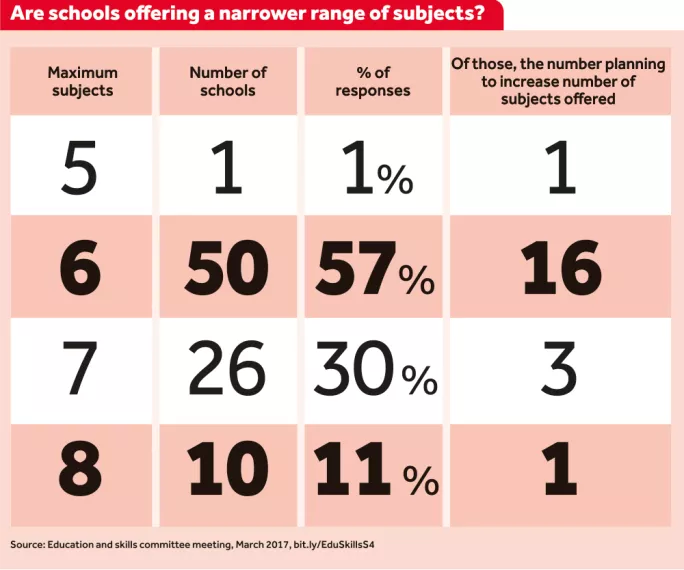Students have a whole new ‘ceiling’ to break through

Secondary headteachers have expressed fears that controversial changes to National courses will “place a ceiling” on the aspirations of many teenagers.
The concerns emerged in a letter from Aberdeenshire’s 17 secondary heads, backed by education director Maria Walker, to the Scottish Qualifications Authority (SQA) - and are said to reflect feelings in other parts of the country.
The letter says that the removal of unit assessments at National 5 - which help to provide a “safety net” if the full qualification is not achieved - could result in many schools “playing it safe” and presenting pupils only at National 4, to ensure that they do not leave without any certification.
This is believed to be the first time that every head in a local authority has banded together to complain about the assessment changes, details of which were first reported by Tes Scotland (“High-stakes exams are back, teachers warn”, 10 February).
Portlethen Academy headteacher Neil Morrison, on behalf of the Association of Secondary Head Teachers in Aberdeenshire, writes: “Unfortunately, the actions taken by the SQA in response to the removal of N5 units has further undermined staff confidence in the SQA and its qualifications.”
No ‘fallback facility’
Concerns include the withdrawal of a “fallback facility” helping unsuccessful N5 candidates to achieve an N4, which the heads fear will result in pupils being categorised as N4 much earlier and “place a ceiling on their aspirations”.
They warn that scrapping N5 unit assessments “effectively creates two very different class groupings which will require different teaching and learning approaches with attendant workload implications”.
Aberdeenshire schools say that they cannot run separate N4 and N5 classes, due to tight finances and stretched staffing. They are also concerned that longer N5 exams, in lieu of unit assessments, will disadvantage pupils who struggle with exams.
Jim Thewliss, general secretary of School Leaders Scotland (SLS), said that the Aberdeenshire letter was the first that he was aware of from any local headteachers’ group, but he added that it reflected wider opinion across the country.
At an SLS meeting in Edinburgh this month - involving school leaders from more than three-quarters of Scotland’s local authorities - he said that “the sentiments expressed in the Aberdeenshire letter were more or less echoed across the country”.
Concerns centred on pupils who have a borderline chance of gaining an N5, but who might now simply be presented for N4 rather than the school running the risk of them emerging from the higher-level course with nothing.
“There is a danger that [schools] play it safe,” said Mr Thewliss, and that they become less likely to encourage “aspirational presentation” among pupils on the cusp of N4 and N5.
‘Aggressive’ timetable
Education secretary John Swinney decided last year to phase out unit assessments at N5 and above from 2018-19, in response to pressure from unions over teacher workload.
However, SQA chief executive Janet Brown told secondary heads in November that the timetable for the changes was “extremely, extremely aggressive”.
An SQA spokesman said: “The removal of units and unit assessments means that we need to strengthen the course assessments to protect the integrity, breadth and standards of National courses.
“For the vast majority of courses, there are no changes to course content and these revisions to assessment adhere to the core principles of Curriculum for Excellence.
“SQA is committed to addressing workload concerns, but must ensure that standards are maintained and that the integrity of the qualifications is protected.”
A Scottish government spokesman said: “We are working with partners, including SQA and the teacher unions, to ensure that the changes will have the anticipated effect. A key part of this is ensuring that young people are presented appropriately at the correct level of qualification, whether that be National 4 or National 5.”
The Assessment and National Qualifications Group - whose members include teaching unions and other national bodies - has devised new guidance on ensuring that pupils do not leave school without qualifications.

You need a Tes subscription to read this article
Subscribe now to read this article and get other subscriber-only content:
- Unlimited access to all Tes magazine content
- Exclusive subscriber-only stories
- Award-winning email newsletters
Already a subscriber? Log in
You need a subscription to read this article
Subscribe now to read this article and get other subscriber-only content, including:
- Unlimited access to all Tes magazine content
- Exclusive subscriber-only stories
- Award-winning email newsletters